|
|
|
Sort Order |
|
|
|
Items / Page
|
|
|
|
|
|
|
| Srl | Item |
| 1 |
ID:
179278
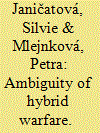

|
|
|
|
|
| Summary/Abstract |
Since the annexation of Crimea in 2014, hybrid warfare has become a widely used yet ambiguous term to describe Russia's hostile activities. In academic publications and policy documents, there have been a plethora of different definitions and concepts to make sense of hybrid warfare. This article takes a bottom-up approach and analyzes the discourse of political and military representatives in the United Kingdom to explore how they understand hybrid warfare by Russia and what the implications are for defense policy. Using qualitative content analysis with quantitative aspects, the results show not only a range of different terms used to describe Russia's hostile activities, but also that the discussed topics do not reflect one particular definition of hybrid warfare. The analysis further reveals that representatives highlight non-military aspects of hybrid warfare over the military ones and consider the role of defense policy dependent on the nature of a particular hybrid threat.
|
|
|
|
|
|
|
|
|
|
|
|
|
|
|
|
| 2 |
ID:
086335
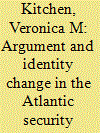

|
|
|
|
|
| Publication |
2009.
|
| Summary/Abstract |
The Atlantic community shares more than just dependable expectations of peaceful change. Its members also share a reflexive political community they sense is worth preserving and a view that their security is intertwined. Existing accounts of the Atlantic security community have identified the importance of renewed emphasis on common values as a factor in preserving and expanding the security community after the Cold War. But, debates at the end of the Cold War also turned on the question of what the allies would do together and what responsibilities they had to each other and to other states. This article outlines a discursive framework and a set of rhetorical strategies used by members of the Atlantic community that explain how they worked to maintain and change their community during debates about their mandate for cooperation. This framework is then applied to the Atlantic community's debates over common action during the Yugoslav wars.
|
|
|
|
|
|
|
|
|
|
|
|
|
|
|
|
| 3 |
ID:
158635
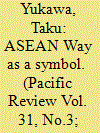

|
|
|
|
|
| Summary/Abstract |
Has the ‘ASEAN Way’ – a set of rules of the Association of Southeast Asian Nations (ASEAN) centered on the principle of non-interference and consensus decision-making – really established its position as an ASEAN norm? This paper aims to analyze the discourses of each ASEAN country and empirically explain their attitudes toward the norm. Specifically, I review various documentations to examine how various ASEAN diplomats have used the term ‘ASEAN Way.’ How did they come to call the principle of non-interference and consensus decision-making ‘ASEAN Way’ in the early 1990s? Why have they begun using the term negatively, as something to be reformed, in recent years? By describing the discourses on the ‘ASEAN Way’ and their changes over the years, I show that the rationality of non-interference and consensus decision-making has changed over time and shifted the positioning of the ‘ASEAN way’ as a symbol. This presents a new and empirical interpretation of the changes in ASEAN Norms.
|
|
|
|
|
|
|
|
|
|
|
|
|
|
|
|
| 4 |
ID:
186319
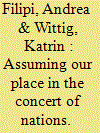

|
|
|
|
|
| Summary/Abstract |
Pierre Nkurunziza died in 2020, just a few months short of completing his tenure as the first post-civil war President of Burundi. Critics have cast him as yet another rebel-turned-politician who came to office on a promise of a democratic transformation but became progressively authoritarian, particularly during his third, disputed term in office. As a political figure, however, Nkurunziza remains poorly understood. What kind of a worldview motivated his politics? Drawing on critical discourse analysis, we identify three recurring themes in Nkurunziza's key political speeches: anti-colonialism; unity and self-sufficiency; and discourse around ‘politics of a new beginning’. These themes were stable across time, indicating Nkurunziza's consistent worldview, but became more pronounced and radical as he faced growing challenges to his legitimacy from within and without. Far from being confined to rhetoric, the themes also manifested in concrete policy decisions, underscoring the urgent need to take ideology seriously in understanding the political trajectories of African leaders.
|
|
|
|
|
|
|
|
|
|
|
|
|
|
|
|
| 5 |
ID:
166923
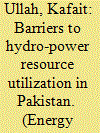

|
|
|
|
|
| Summary/Abstract |
The share of hydro power in the energy mix of Pakistan has not exceeded beyond 40% despite abundant hydro-power potential in the country. Owing to the slow pace of hydro-power development under the public sector, various policy frameworks and institutional arrangements have been introduced to develop the resources by involving the private sector. Even those arrangements have not succeeded in directing the attention of private investment towards the hydropower but the thermal sector. This study investigates the reasons behind the slow progress of hydro-power sector in Pakistan. A mixed approach comprising NVIVO analysis and Q methodology has been used to explore the impending reasons. Both, primary and secondary data, in the form of interviews, published reports, papers and other documents related to the hydro-power sector of Pakistan were collected for the analysis purpose. NVIVO analysis of primary and secondary data identified important variables that were further used for Q methodology. Q methodology revealed four important discourses on barriers to the hydro-power development in Pakistan. Discourses included less participation of private sector in running the electricity market operations, incoherent planning, financial barriers and institutional barriers. The revelation of these discourses is important for framing policies on the development of indigenous renewable energy resources in Pakistan.
|
|
|
|
|
|
|
|
|
|
|
|
|
|
|
|
| 6 |
ID:
058815
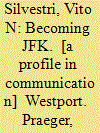

|
|
|
|
|
| Publication |
Westport, Praeger, 2000.
|
| Description |
xiv, 323p.hbk
|
| Standard Number |
027596762X
|
|
|
|
|
|
|
|
|
|
|
|
Copies: C:1/I:0,R:0,Q:0
Circulation
| Accession# | Call# | Current Location | Status | Policy | Location |
| 043414 | 973.922/SIL 043414 | Main | On Shelf | General | |
|
|
|
|
| 7 |
ID:
132355
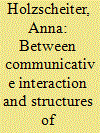

|
|
|
|
|
| Publication |
2014.
|
| Summary/Abstract |
This paper discusses contemporary engagement with the theory and analysis of discourse in international relations. It argues that discourse understood as "meaning in use" has emerged as one of the core concepts in constructivist scholarship, being of tremendous theoretical and analytical value. The paper identifies two distinct types of discourse analysis around which most contributions in this field converge: micro-interactional approaches that emphasize the communicative, pragmatic aspects of discourse and macro-structural approaches focusing on discourse as structures of signification. What unites these studies is their interest in the diffuse power relationships that characterize social interaction in international politics and the productive effects of power that the term "discourse" serves to underline. Through a combination of these two different strands of discourse research, with two different conceptualizations of power (deliberative and productive), the paper develops a taxonomy of discourse approaches that reflects four distinct variants of discourse research. These variants are illustrated by means of an in-depth discussion of recent innovative studies. In conclusion, the paper points to a number of limitations in the present conceptualization of power through discourse as well as in terms of the uneasy combination of positivist epistemology and constructivist ontology in much empirical discourse research. Discussing the overlap between discourse and practice scholarship, the paper sketches future directions for research in this field.
|
|
|
|
|
|
|
|
|
|
|
|
|
|
|
|
| 8 |
ID:
183991
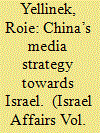

|
|
|
|
|
| Summary/Abstract |
This article examines China’s media strategy and activities towards Israel, underscoring its recent increase in intensity. By way of doing so, the article explores Beijing’s use of journalism and other Israeli media outlets on the one hand, and the employment of direct Chinese soft power tools, from China Radio International (CRI), to the establishment of Chinese institutes in Israel, to public and media activities of Israel-based Chinese diplomats.
|
|
|
|
|
|
|
|
|
|
|
|
|
|
|
|
| 9 |
ID:
187411
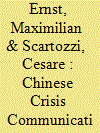

|
|
|
|
|
| Summary/Abstract |
This paper examines China's international communication strategy during the initial phase of the global COVID-19 pandemic. In the spring of 2020, Western governments and media began criticising the systematic lack of transparency and accountability in the Chinese political system in relation to the failed containment of the Wuhan outbreak. Facing an unprecedented reputational crisis, the Chinese Communist Party (CCP) mobilised its foreign-language media in an attempt to influence the international discourse on COVID-19. Surveying the English and Chinese editions of the People's Daily, this study identifies CCP discourses aimed at foreign audiences and traces their evolution during the early stages of the pandemic. Overall, the study provides a comprehensive map of Chinese narratives on COVID-19 and generates fresh insights into CCP crisis communication.
|
|
|
|
|
|
|
|
|
|
|
|
|
|
|
|
| 10 |
ID:
174713
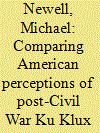

|
|
|
|
|
| Summary/Abstract |
Recently, public debates have questioned whether or not the American government responds differently to terrorism by white, right-wing, Americans. This article examines a historical period in which similar dynamics were on display in state responses to the Reconstruction-era Ku Klux Klan (KKK), Irish-American Fenians, and anarchists from 1860 to 1920. This history suggests that political officials responded to these groups more on the basis of ideas than their actual levels of violence, including discourses of Americanism shaped by ideology, nativism, and racism. Successful claims to ‘Americanism’ lent the KKK a sense of familiarity that led it to be seen as less of a threat to ontological security, even as it posed a significant threat of physical violence. In contrast, the ideologically subversive and foreign anarchists were responded to more severely, despite being responsible for far fewer deaths and injuries than the KKK. This history suggests that American counter-terrorism has been influenced by factors of racial and national belonging in the past, and provides significant context for the consideration of current debates about responses to right-wing groups.
|
|
|
|
|
|
|
|
|
|
|
|
|
|
|
|
| 11 |
ID:
146994
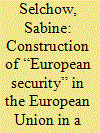

|
|
|
|
|
| Summary/Abstract |
In June 2015 High Representative Mogherini presented her strategic assessment The European Union in a changing global environment as the express point of reference for the new EU Global Strategy. Grounded in the premise that this assessment is not simply a description of the state of the world but plays into the construction of social reality, this article sets out to understand the openings and closings of possibilities that it holds. My analysis generates a number of concrete insights, ranging from insights into the distinct nature of the challenges the EU is facing, to the discovery that there is no “existential threat” and the importance of “regions” as a guiding category. Grounded in an understanding of the world as being reflexive modern, I interpret these findings as displaying an intriguing and paradoxical interpretive disposition. On the one side, there is a notable opening towards unconventional conceptions of the world; on the other side, there is a symbolic conservation of existing EU institutions and programmes and a reproduction of modern premises. I argue that it is the first aspect that makes the document significant: Mogherini’s strategic assessment opens an important discursive space to think (European) security anew.
|
|
|
|
|
|
|
|
|
|
|
|
|
|
|
|
| 12 |
ID:
181944
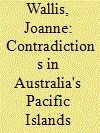

|
|
|
|
|
| Summary/Abstract |
The Australian government demonstrates strategic anxiety about the ‘crowded and complex’ geopolitics of the Pacific Islands region. This reflects its broader concerns about geostrategic competition in the ‘Indo-Pacific’, and its perception that Pacific states are ‘small’ and ‘weak’ and therefore vulnerable to influence from potentially hostile powers. Simultaneously, the government has vowed to ‘step-up’ its engagement with its ‘Pacific family’, emphasising that its relationships with Pacific states will be characterised by respect for, and listening to them, as equals. But while the government has articulated its intention to improve its relationships with Pacific states, puzzlingly, it adopts policies that undermine this goal. This article analyses how and why this occurs. It outlines what this analysis demonstrates about how leaders and officials perceive the Pacific, what assumptions and habits inform those beliefs, and as the ‘step-up’ moves from announcement to implementation, how they are translated into behaviour via government policy. It concludes by arguing that Australian leaders and officials should seek consistency in their discourse about, and policies toward, the Pacific, guided by the discourse of the ‘Blue Pacific’.
|
|
|
|
|
|
|
|
|
|
|
|
|
|
|
|
| 13 |
ID:
146006
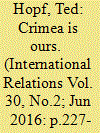

|
|
|
|
|
| Summary/Abstract |
Russia could have annexed Crimea anytime in the last 25 years. The fact that it did so only in March 2014 is a puzzle. I argue that the predominant discourse of Russian national identity by 2014 made the annexation of Crimea and military intervention in eastern Ukraine both thinkable and natural to Moscow. A history of the discursive terrain of Russia from 1992 to 2014 shows how Russia’s national identity has evolved over the years, both in response to Western inactions or actions and domestic developments. But Russian identity is not a sufficient explanation for Russian behavior in Ukraine. For that, we must pay attention to the event itself: Western support for the Maidan protestors, Western failure to adhere to the February 2014 agreements reached with Moscow on a transitional government in Ukraine with Yanukovych at its head and new elections in November, the presence of disgruntled Russians in Ukraine, and perhaps most important, over a decade of US unilateralism in foreign affairs.
|
|
|
|
|
|
|
|
|
|
|
|
|
|
|
|
| 14 |
ID:
192129
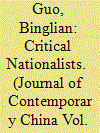

|
|
|
|
|
| Summary/Abstract |
This study systematically examines, deconstructs, and maps the quotidian nationalist discourse among Chinese netizens and analyzes their ‘liking’ behavior on the social media platform, Zhihu, in order to investigate what and how they talk about nationalism. The analysis of the quotidian expression of nationalism marks a shift from the previous practice of relying on high-profile nationalist movements as evidence which may create an incomplete or inaccurate impression that much of Chinese nationalism is virulent and over-zealous. This study finds that Zhihu users are critical nationalists who are competitive but judicious. The existence of levelheaded nationalists in China’s online space suggests the limits of strident nationalist contagion and nationalist mobilization.
|
|
|
|
|
|
|
|
|
|
|
|
|
|
|
|
| 15 |
ID:
048852
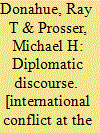

|
|
|
|
|
| Publication |
Greenwich, Ablex Publishing Corporation, 1997.
|
| Description |
xii, 385p.
|
| Series |
Communication, culture and information studies
|
| Standard Number |
1567502903
|
|
|
|
|
|
|
|
|
|
|
|
Copies: C:1/I:0,R:0,Q:0
Circulation
| Accession# | Call# | Current Location | Status | Policy | Location |
| 039692 | 327.2/DON 039692 | Main | On Shelf | General | |
|
|
|
|
| 16 |
ID:
143594
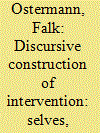

|
|
|
|
|
| Summary/Abstract |
This article analyses French executives' and lawmakers' legitimisations of the intervention in Libya with the aim of understanding the discursive construction of intervention. It investigates the arguments in favour of intervention and the oppositions they were confronted with. To these arguments belong a re-evaluated democratic legacy of France, an identification with the Libyan people, and a debate on Responsibility to Protect and the rule of law in world politics, which have a broader relevance for French actorness abroad. The article applies the Essex School discourse theory and techniques from Interpretive Policy Analysis on executive speeches and parliamentary documents for structuring the debate and for estimating the strength of ideas in their interdiscursive configuration. An ideal-typical explanation of the legitimisation of intervention and of the choice of one policy over another is made. The article argues that going to war in Libya equated to a question of cultural appropriateness.
|
|
|
|
|
|
|
|
|
|
|
|
|
|
|
|
| 17 |
ID:
142066
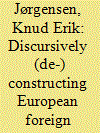

|
|
|
|
|
| Summary/Abstract |
This article is about European foreign policy, specifically an examination of ways in which discourse analysis and foreign policy analysis can be brought together. The first aim of this article is to explicate the explanandum in some detail. Before we know what we are looking for, it gives limited meaning to consider procedures for methodological procedures. Once the explanandum has been identified, the article examines theoretical approaches and critically discusses their promises and limitations. Priority is given to the option of applying constructivist discursive theories that might (or might not) have been developed with a view to analysing foreign policy, including European foreign policy. In doing so, the article aims at bridging several sometimes very different fields of study: discourse theory, which is sometimes utterly unaware of or uninterested in foreign affairs; and foreign policy analysis, which is frequently descriptive in orientation and at times characterized by less-than-benign neglect of discourse theory.
|
|
|
|
|
|
|
|
|
|
|
|
|
|
|
|
| 18 |
ID:
157075
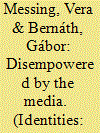

|
|
|
|
|
| Summary/Abstract |
Roma communities have experienced widespread historical exclusion in most European countries. The media can be a powerful instrument of a group’s inclusion into the mental map of a society, or, on the contrary, it can contribute to the group’s exclusion and disempowerment. This article builds on a series of content and discursive analyses of the news media’s coverage of Hungarian Roma communities since 1993, interviews with stakeholders and focus group discussions in Roma communities. It scrutinises media reporting about Roma and argues that, in general, the scope and the agenda of Roma’s portrayal coincide with mainstream society’s stereotypes about the group. The article will additionally look at the media’s disempowering role from two perspectives: on the one hand, the extent to which Roma have access to influencing media content, and on the other hand, it will consider the role of minority communities in challenging stereotypical images.
|
|
|
|
|
|
|
|
|
|
|
|
|
|
|
|
| 19 |
ID:
101007
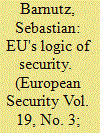

|
|
|
|
|
| Publication |
2010.
|
| Summary/Abstract |
This article develops a methodological approach to analyse the logic of security in the European Union (EU) as an inter-subjective construction. Security is established when discursive practices take place at the interplay of three different fields: (1) EU identity constructions; (2) the perception of challenges as security relevant; and (3) constructions of security practices and hence discourses on governance and governmentality. When discursive practices make cross-references between these fields they construct the logic of security. The empirical section applies this method in order to analyse the EU's logic of security at the turn of the twenty-first century. Understanding the dynamic effects at play between situations of under-development and conflict led not only to the construction of the need to implement civilian as well as military capabilities at the EU level, but this dynamic is also central to understanding the EU's way of approaching international terrorism.
|
|
|
|
|
|
|
|
|
|
|
|
|
|
|
|
| 20 |
ID:
190973
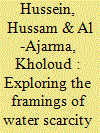

|
|
|
|
|
| Summary/Abstract |
Water scarcity in Palestine is a top national priority issue. Extensive research has analysed the causes of water scarcity in Palestine, focusing on negotiations, the occupation, climate change, environmental conditions, the role of international donors and funders, and mismanagement. Nevertheless, how these representations are reflected in Palestinian textbooks has not been investigated. However, textbooks are key because they reflect the governmental position and dominant discourses and forge future generations’ understandings of water issues. This paper takes textbooks as a case study to analyse the dominant discourses of water scarcity in Palestine.
|
|
|
|
|
|
|
|
|
|
|
|
|
|
|
|
|
|
|
|
|